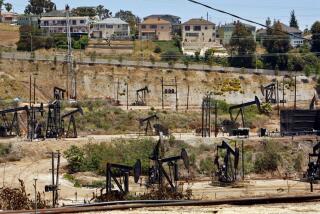War’s Enduring Ecological Scars
- Share via
The incendiarism of Kuwait’s oil fields last February may well rank as history’s greatest ecological crime. Retreating Iraqi troops blew up most of the country’s producing wells, setting off 732 fires that continued to be fed from enormous underground pools of oil and natural gas. An estimated 6 million barrels of oil a day was being consumed when firefighters from around the world began arriving in March.
Initial fears that the fires could take years to extinguish happily proved mistaken. This week the last of the well fires was extinguished, only to be purposely reignited a few days later so that the emir of Kuwait, Sheik Jabbar al Ahmed al Sabah, could symbolically if needlessly push a lever to stop the flow of oil to the burning well.
Kuwait puts the cost at $1.5 billion to extinguish the fires, in addition to about $12 billion in lost oil. In all, 600 million barrels of oil went up in flames, about 3% of Kuwait’s reserves.
The most lasting loss has been inflicted on the region’s environment. The tens of thousands of tons of toxic gases and particles thrust into the atmosphere by the fires are expected to remain a threat to marine life far into the future. On land, in and near the oil fields, hundreds of pools containing up to 30 million barrels of crude imperil the desert’s fragile ecology.
Between 6 million and 8 million barrels are believed to have been spilled into the Persian Gulf during the war, devastating marine life. Fish near Bahrain are dying of a mysterious disease that scientists blame on the spill. So are vital plankton, at the bottom of the Gulf food chain. Migratory birds that annually feed and rest along the Saudi shoreline may be especially endangered.
So although the fires have been put out, their terrible legacy seems certain to linger. All this, it must not be forgotten, is the result not of some natural disaster or even of an accident of war. It is the product of wanton vengefulness by Iraq’s dictator, Saddam Hussein.
The U.N. Security Council has said Iraq must pay for the monetary losses suffered by Kuwait and its neighbors. But there is no way to compensate for the environmental damage. Of the many unforgiveable crimes committed by Hussein, this is likely to prove the most enduring.
More to Read
Sign up for Essential California
The most important California stories and recommendations in your inbox every morning.
You may occasionally receive promotional content from the Los Angeles Times.










